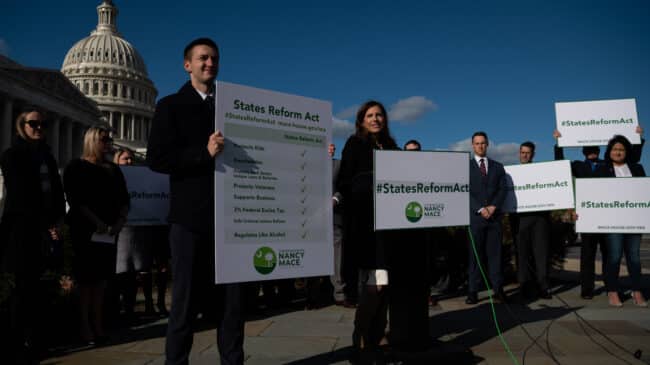This month, Rep. Nancy Mace, a Republican from South Carolina, introduced a bill to legalize cannabis in the United States.
The proposed legislation would remove marijuana from the federal Controlled Substances Act, lifting the barriers currently faced by state-licensed marijuana businesses across the country in states that have already legalized cannabis. Aptly called the States Reform Act, this Republican-led effort, which follows several previous proposals from Democrats in Congress, could motivate Congress to finally form the bipartisan coalition that will be necessary for marijuana reform to make it to the president’s desk.
Thirty-eight states have legalized marijuana in some form — 20 have legalized recreational and medical marijuana and another 18 have legalized only medical marijuana. Those numbers will likely grow soon as legalization is under consideration in additional states.
In other words, state-legal marijuana markets are quickly becoming the norm and thousands of marijuana businesses have gained licenses in recent years. More than 320,000 Americans work in the industry today, and many of these individuals are precluded from getting a home loan or even opening a bank account because of the way federal laws treat their state-legal employment. Recent polls have also indicated two-thirds of Americans support federal legalization.
Federal legalization seems inevitable at this point. But the sooner it can be done, the better.
As Supreme Court Justice Clarence Thomas recently lamented, “A prohibition on intrastate use or cultivation of marijuana may no longer be necessary or proper to support the federal government’s piecemeal approach.”
Although the Biden administration says it continues to oppose marijuana legalization and fired White House staffers who admitted to past marijuana use, the real questions on marijuana legalization are simply when and how it will be done.
The U.S. House passed the Marijuana Opportunity Reinvestment and Expungement Act in the waning days of the last Congressional session, as a largely symbolic gesture, knowing the then-Republican controlled Senate would have no time or interest in acting. A version of that bill is again making its way through House committees again but seems very unlikely to gain Republican support. Sens. Chuck Schumer, Cory Booker, and Ron Wyden have also circulated draft language for a Cannabis Administration and Opportunity (CAO) Act and, although that bill hasn’t been formally introduced, the Senate majority leader’s sponsorship is notable. But, that proposed language has multiple shortcomings, ranging from a punitive tax rate that would likely dissuade consumers and producers from leaving the black market to regulatory costs that would have a similar effect. Moreover, even Sen. Schumer himself admits he doesn’t have the Republican votes to pass the CAO through the Senate, where he will need at least 10 Republicans to stifle a filibuster.
Enter the States Reform Act. Rep. Mace is a Republican from a state where marijuana is neither legal for medical nor adult use. But the Citadel graduate cares about veteran access and the rule of law, which, as Justice Thomas noted, has broken down under the federal government’s “piecemeal approach” to marijuana.
The States Reform Act also makes several improvements to previous marijuana legalization proposals. First, it instructs the attorney general to remove marijuana entirely from the Controlled Substances Act, thereby eliminating current barriers to financial services, small business loans, and other related issues facing marijuana entrepreneurs.
Second, it would establish the Bureau of Alcohol, Tobacco and Firearms as the primary regulator for cannabis and would task it with oversight of transferring inventory from one state to another. Many states still name marijuana within their versions of the Controlled Substances Act and would be free to retain or remove this restriction as they see fit. But the States Reform Act would allow for free and open interstate commerce so consumers gain access to the products they like from any legal state.
Third, the legislation would make it easy and inexpensive to get a federal permit to operate a marijuana business, expanding opportunities for aspiring entrepreneurs.
Fourth, it would rely on the expertise developed by state regulators without imposing costly new barriers for product approval that could sink many small businesses.
Finally, it would limit federal excise taxes to 3% of a product’s value — a vast improvement over the 25% tax rate included in the CAO draft.
For marijuana legalization to become a reality, a broad bipartisan congressional coalition of support is necessary. Whether President Biden would sign the proposed bill is an open question, but the introduction of the States Reform Act provides another promising advancement in marijuana legalization efforts.
A version of this column previously appeared at RealClearPolicy.

